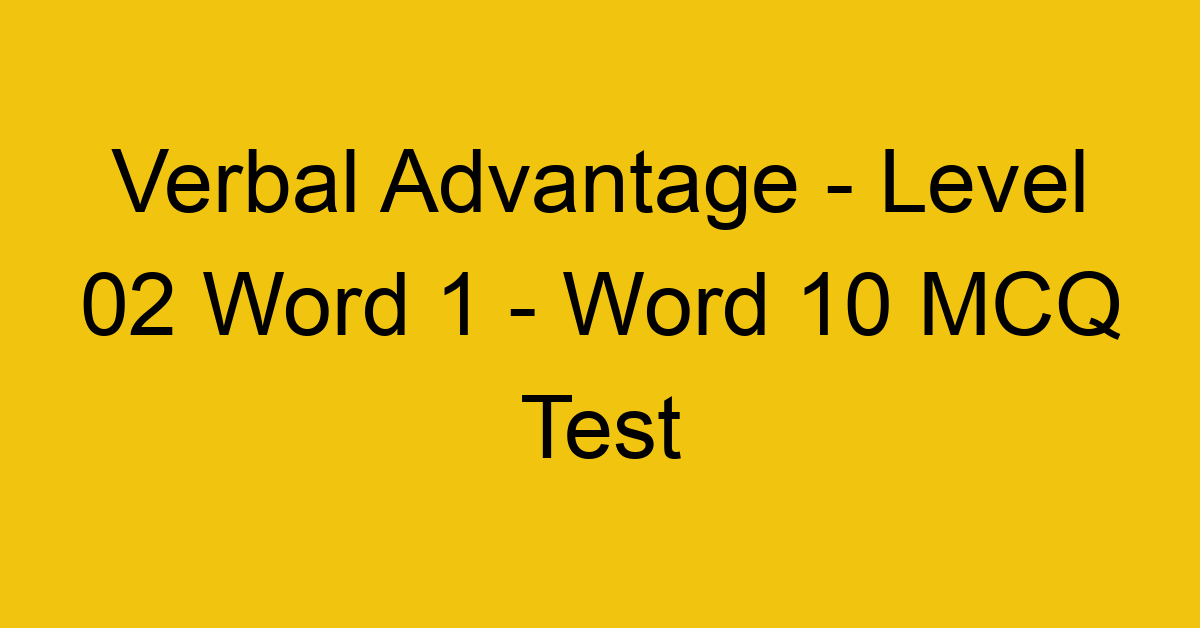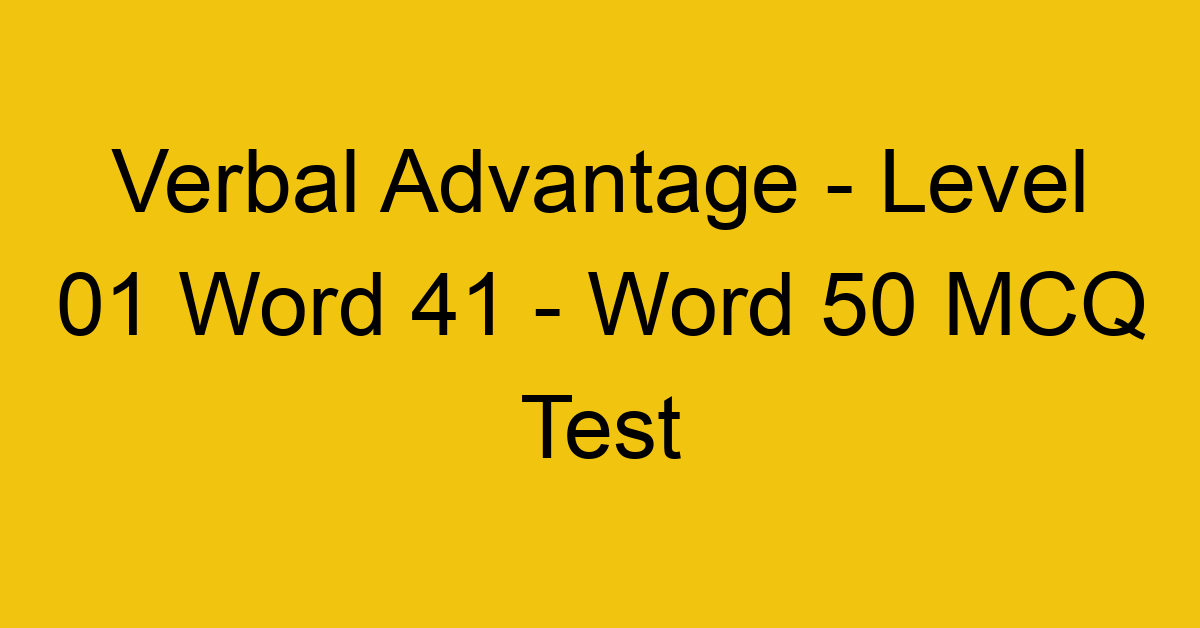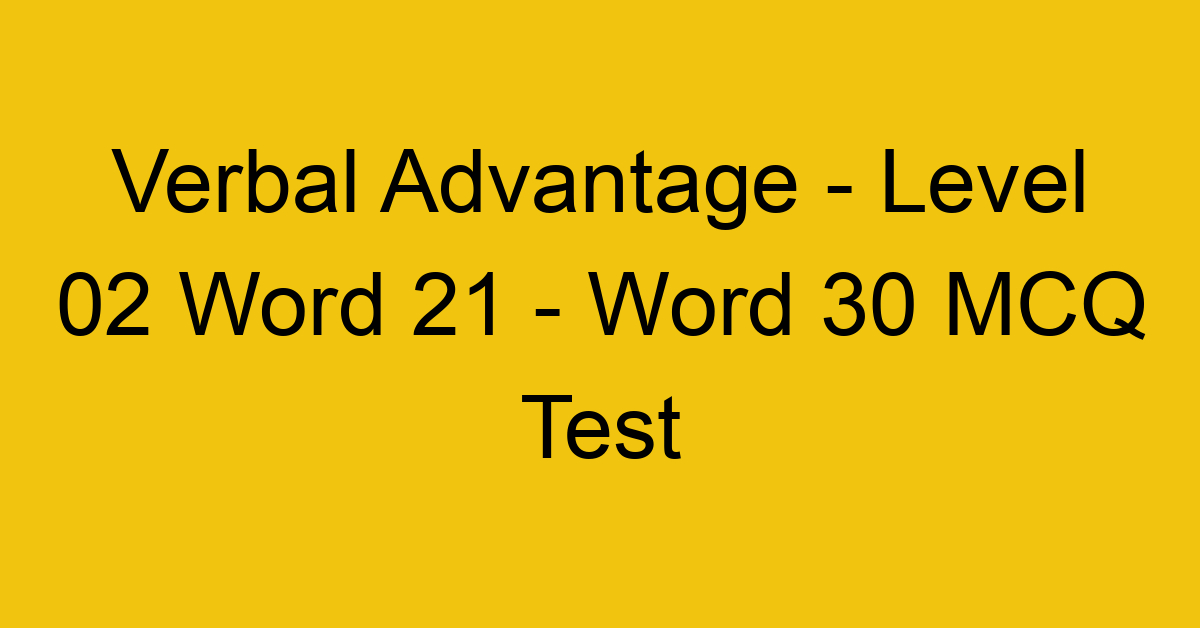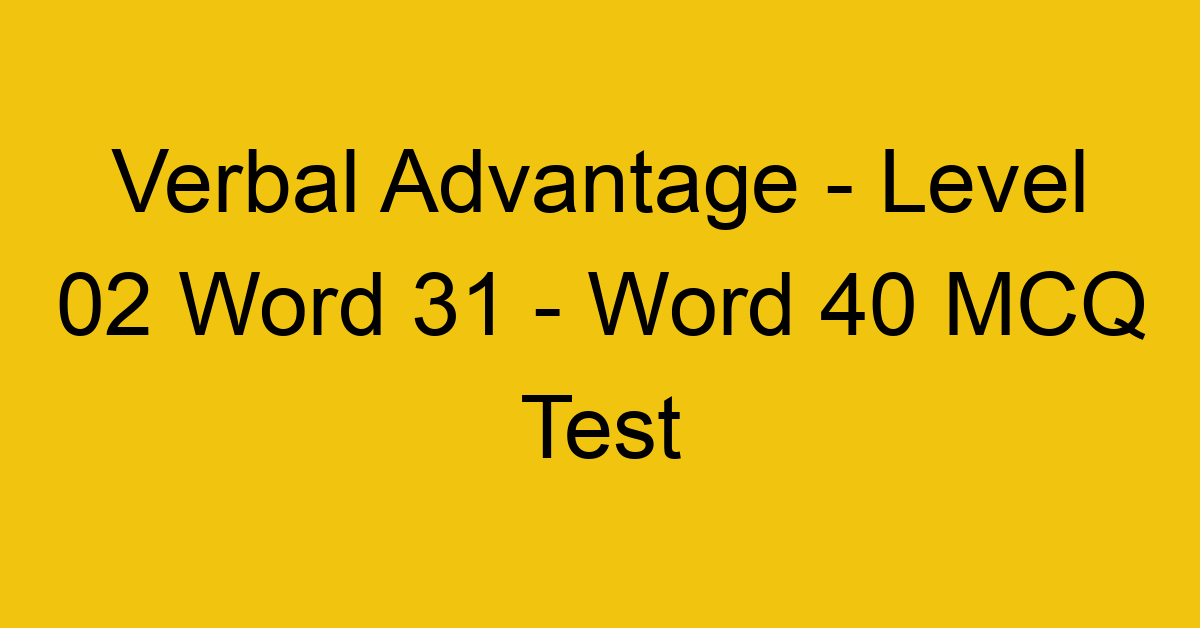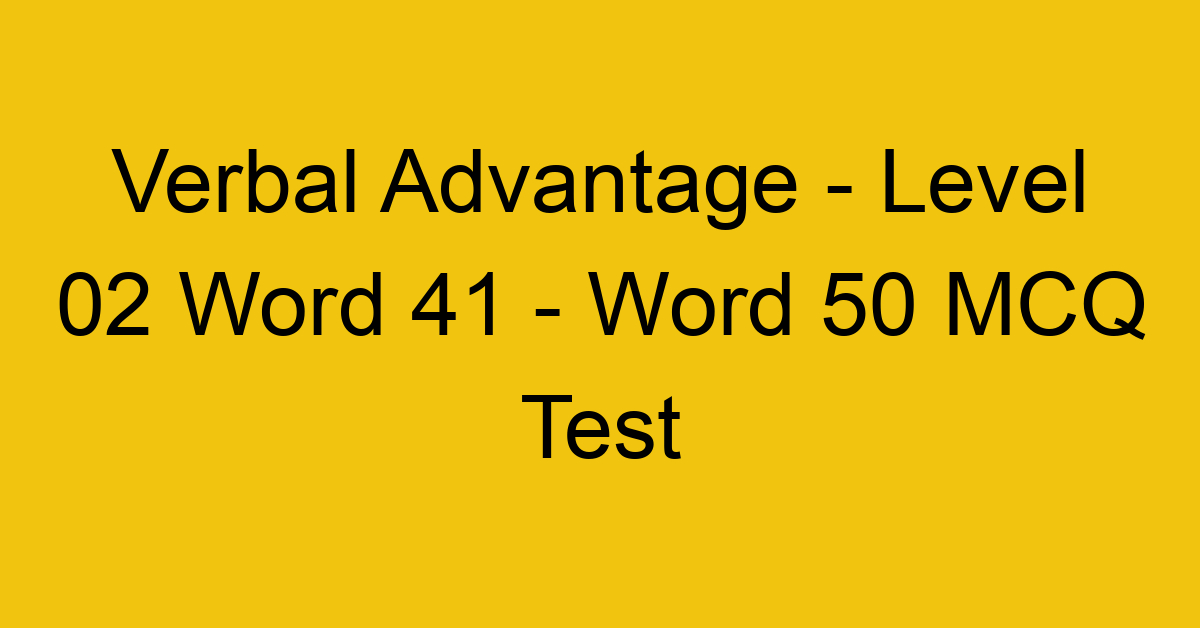Verbal Advantage - Level 02 Word 11 - Word 20 MCQ Test
Word List
- Word 11: Gullible [GUHL-uh-bul]
Easily deceived, fooled, or cheated.
→
A more difficult synonym of gullible is credulous (KREJ-uh-lus). Credulous comes from the Latin credere, to believe, and means inclined to believe, willing to accept something as true without questioning.
To gull is to take advantage of someone who is foolish, unwary, or inexperienced. The gullible person is easily gulled, fooled, cheated. To dupe and to gull both mean to take advantage of. Dupe suggests unwariness on the part of the victim; gull suggests a willingness or readiness to be deceived.
- Word 12: Benign [bi-NYN, rhymes with resign]
Kindly, good-natured, gracious, mild, having or showing a gentle disposition, as a benign old man, a benign smile, a benign intention, a benign government.
→
That is the first meaning of benign listed in dictionaries, and probably the most common. The word is also used in several other ways. It may mean favorable, positive, propitious: a benign omen; a benign view. It may be used of the weather or climate to mean healthful, wholesome, salubrious. And in medicine benign means mild, not deadly or severe, as a benign tumor or disease.
- Word 13: Peripheral [puh-RIF-uh-rul]
External, outer, lying at or forming the outside or boundary of something; hence, not essential, irrelevant.
→
The noun periphery means the boundary, the external surface or area. It may be used literally, as in “exploring the periphery of the polar icecap,” “situated on the periphery of the combat zone”; or it may be used figuratively, as in “the periphery of consciousness,” “the periphery of one’s sphere of influence.”
Peripheral may mean external in the literal sense of lying at the edge or on the boundary, or external in the figurative sense of irrelevant, nonessential, as peripheral issues, a peripheral point, or peripheral considerations.
- Word 14: Rebuff [ri-BUHF]
To refuse bluntly, reject sharply, turn down abruptly, snub, spurn.
→
In colloquial terms—that is, in informal, conversational language—rebuff means to give the cold shoulder to, slam the door on, nix. A rebuff is an abrupt refusal or rejection, especially of a request, an offer to help, or a person making advances. To rebuff means to refuse or reject bluntly.
- Word 15: Animosity [AN-i-MAHS-i-tee]
Ill will, hostility, antagonism, strong dislike or hatred: “There was long-standing animosity between the two families.” “After her coworker apologized for his rude remarks, she resolved not to harbor any animosity toward him.”
→
More difficult synonyms of animosity include malice (MAL-is), aversion (uh-VER-zhun), malevolence (muh-LEV-uh-lints), antipathy (an-TIP-uh-thee), rancor (RANG-kur), and enmity (EN-mi-tee).
- Word 16: Tenuous [TEN-yoo-us]
Thin, slender, slight, flimsy, weak, not dense or substantial, lacking a strong basis.
→
At high altitudes, air is tenuous, thin. In chemistry, certain fluids or compounds are said to be tenuous, not dense. In general, nonscientific usage, tenuous refers to something weak or flimsy, that has little substance or strength: a tenuous grip, a tenuous proposal, a tenuous argument, or tenuous construction.
- Word 17: Complacent [kum-PLAY-sint]
Self-satisfied, smug, overly pleased with oneself.
→
Complacent suggests being so satisfied with one’s abilities, advantages, or circumstances that one lacks proper concern for the condition of others and is unaware of the situation around one. A complacent smile is a smug, self-satisfied smile. Complacent behavior is self-centered and disregards others’ concerns. A complacently ignorant person is completely satisfied with his ignorance; he does not know he lacks knowledge and would not care if he did.
Complacent and complaisant (kum-PLAY-zint) should be distinguished in spelling, pronunciation, and meaning. Complaisant, with a z sound for the s in the final syllable, means inclined to please, gracious, obliging, courteous, affable (AF-uhbul), urbane (ur-BAYN). It has a positive connotation. Complacent, with an s sound for the c in the final syllable, has a negative connotation. Complacent means self-satisfied, smug, overly pleased with oneself.
- Word 18: Acme [AK-mee]
The peak, highest point, summit, zenith, especially the point of culmination, the highest possible point in the development or progress of something.
→
Here’s a funny story about vocabulary development.
I learned the word acme as a young boy watching the “Roadrunner” cartoons on television, in which Wile E. Coyote uses various products made by the “ACME” company in his obsessive quest to capture the Roadrunner. Of course the coyote’s plans always backfire, and he usually winds up flying headlong over some precipitous cliff. Through the power of association I have since connected the height of those cliffs with the word acme, the peak, highest point.
You see, even watching television can help you build your vocabulary. However, reading Verbal Advantage along with a regular diet of general reading is a far more effective method.
Acme comes directly from a Greek word meaning the highest point, extremity. The word is often used figuratively to mean the highest point in the development or progress of something, as in “the acme of his career,” “a company at the acme of the industry.” The corresponding adjective is acmatic (ak-MAT-ik): “Albert Einstein’s theory of relativity was an acmatic scientific breakthrough.” The antonym of the acme is the nadir (NAY-dur), the lowest point.
- Word 19: Defunct [di-FUHNGKT]
Dead, extinct, obsolete; no longer in existence, effect, operation, or use.
→
Defunct comes from the Latin defunctus, dead, departed, finished. A defunct law is no longer in existence or effect; a defunct organization is no longer functioning or doing business; a defunct factory is no longer in operation; a defunct procedure is no longer in use; a defunct species is extinct; a defunct expression is no longer in use; a defunct idea is no longer useful or popular; and a defunct person is dead.
- Word 20: Abet [uh-BET]
To encourage, support, help, aid, promote, assist in achieving a purpose.
→
Some dictionaries note that abet means especially to encourage or assist in wrongdoing, as in the legal cliché “to aid and abet,” meaning to assist a criminal in the commission of a crime. That sense is perhaps more common, but abet may also be used favorably, as “to abet the cause of justice,” “to abet the committee’s efforts to get the plan approved.”

